

AlphaLISA SureFire Ultra Human and Mouse Phospho-p62 (SQSTM1) (Ser351) Detection Kit, 100 Assay Points
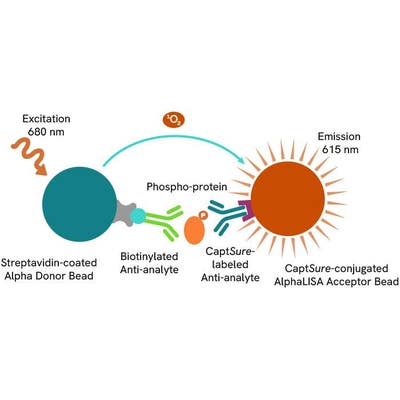
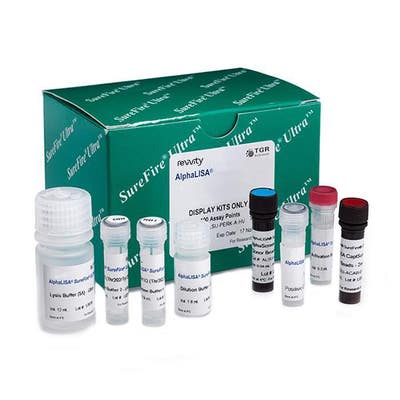
 View All
View All
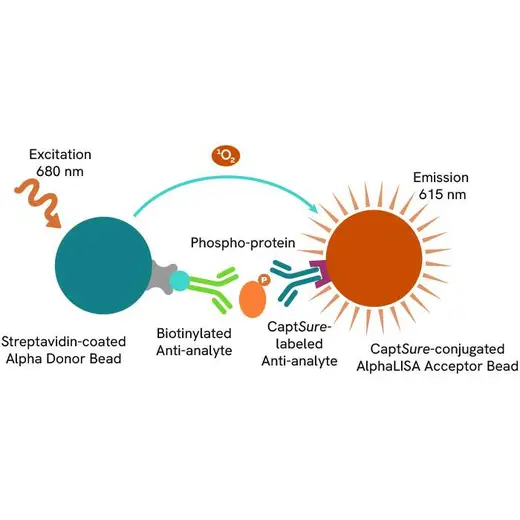
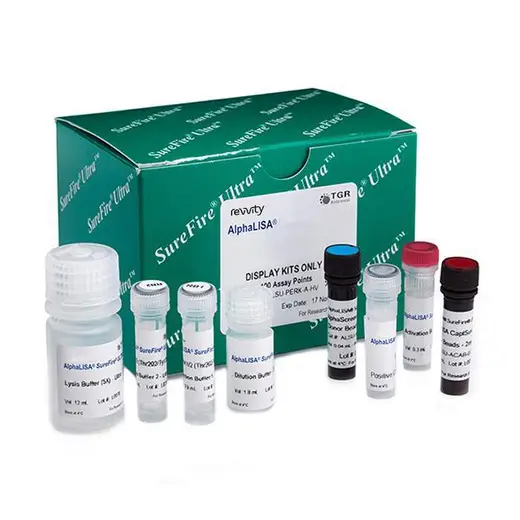





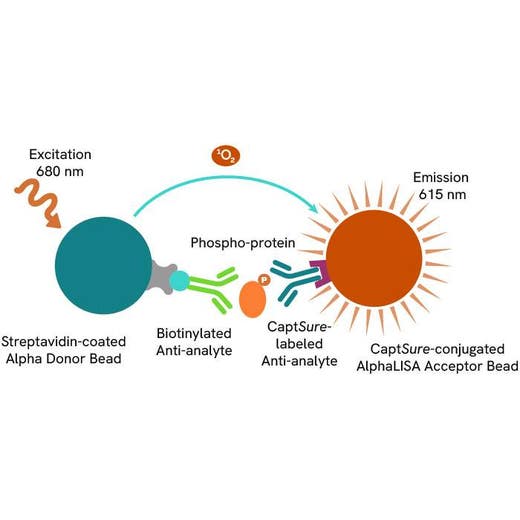
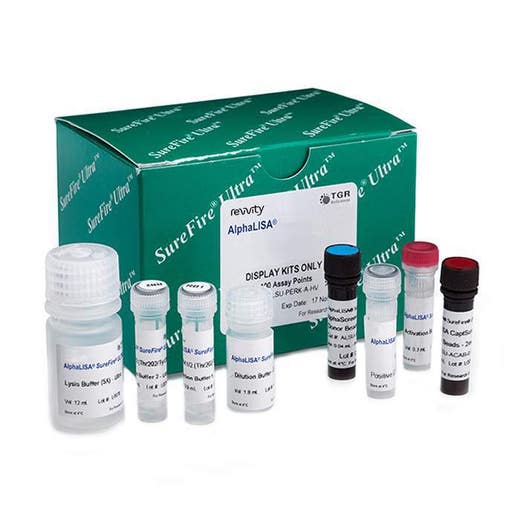





| Feature | Specification |
|---|---|
| Application | Cell Signaling |
| Sample Volume | 30 µL |





















Product information
Overview
Sequestome-1 or ubiquitin binding protein p62 (SQSTM1 p62) is an autophagosome cargo protein that targets other proteins that bind to it for selective autophagy. SQSTM1 p62 is an adaptor protein that has an increased affinity for ubiquitin chains after phosphorylation, thus enabling SQSTM1 p62 to bind to ubiquitinated cargo proteins. Ubiquitinated proteins or ubiquitin-coated mitochondria associated with SQSTM1 p62 proteins are taken away in phagosomes, whose content is cleared out after lysosomal fusion. SQSTM1 p62 is implicated in Alzheimer’s disease, Huntington’s disease, NASH, and numerous types of cancer.
The AlphaLISA SureFire Ultra Human and Mouse Phospho-SQSTM1 p62 (Ser351) is a sandwich immunoassay for the quantitative detection of phospho-SQSTM1 p62 (Ser351) in cellular lysates, using Alpha Technology.
Formats:
- The HV (high volume) kit contains reagents to run 100 wells in 96-well format, using a 60 μL reaction volume.
- The 500-point kit contains enough reagents to run 500 wells in 384-well format, using a 20 μL reaction volume.
- The 10,000-point kit contains enough reagents to run 10,000 wells in 384-well format, using a 20 μL reaction volume.
- The 50,000-point kit contains enough reagents to run 50,000 wells in 384-well format, using a 20 μL reaction volume.
AlphaLISA SureFire Ultra kits are compatible with:
- Cell and tissue lysates
- Antibody modulators
- Biotherapeutic antibodies
Alpha SureFire kits can be used for:
- Cellular kinase assays
- Receptor activation studies
- Screening
How it works
Phospho-AlphaLISA SureFire Ultra assay principle
The Phospho-AlphaLISA SureFire Ultra assay measures a protein target when phosphorylated at a specific residue.
The assay uses two antibodies which recognize the phospho epitope and a distal epitope on the targeted protein. AlphaLISA assays require two bead types: Acceptor and Donor beads. Acceptor beads are coated with a proprietary CaptSure™ agent to specifically immobilize the assay specific antibody, labeled with a CaptSure tag. Donor beads are coated with streptavidin to capture one of the detection antibodies, which is biotinylated. In the presence of phosphorylated protein, the two antibodies bring the Donor and Acceptor beads in close proximity whereby the singlet oxygen transfers energy to excite the Acceptor bead, allowing the generation of a luminescent Alpha signal. The amount of light emission is directly proportional to the quantity of phosphoprotein present in the sample.

Phospho-AlphaLISA SureFire Ultra two-plate assay protocol
The two-plate protocol involves culturing and treating the cells in a 96-well plate before lysis, then transferring lysates into a 384-well OptiPlate™ plate before the addition of Phospho-AlphaLISA SureFire Ultra detection reagents. This protocol permits the cells viability and confluence to be monitored. In addition, lysates from a single well can be used to measure multiple targets.
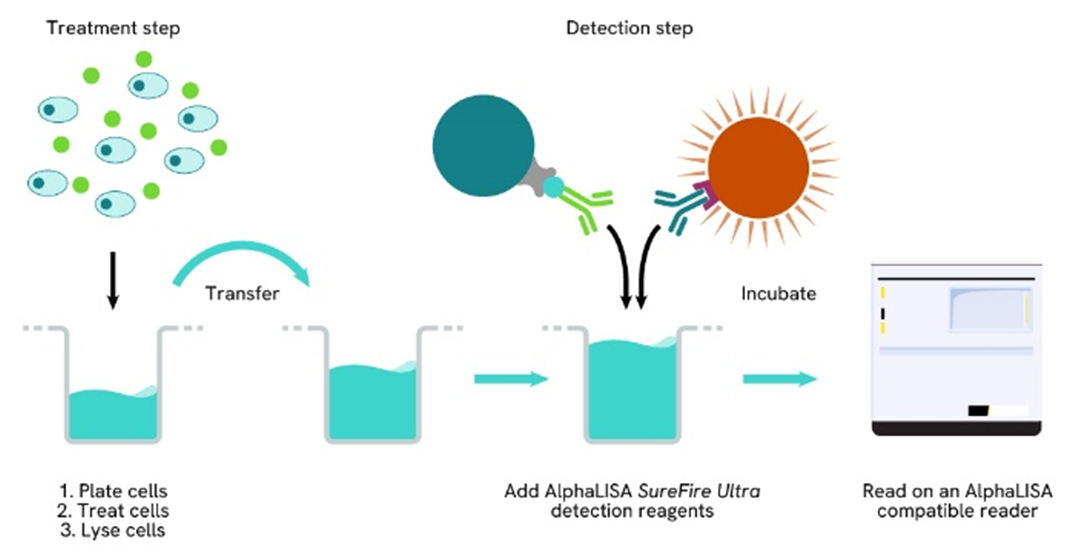
Phospho-AlphaLISA SureFire Ultra one-plate assay protocol
Detection of Phosphorylated target protein with AlphaLISA SureFire Ultra reagents can be performed in a single plate used for culturing, treatment, and lysis. No washing steps are required. This HTS designed protocol allows for miniaturization while maintaining AlphaLISA SureFire Ultra quality.
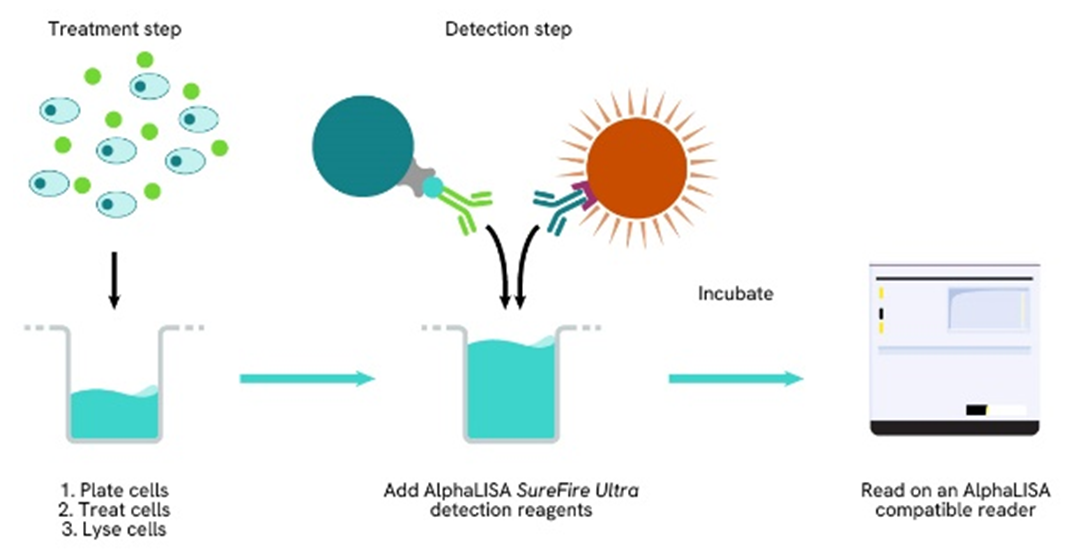
Specifications
| Application |
Cell Signaling
|
|---|---|
| Automation Compatible |
Yes
|
| Brand |
AlphaLISA SureFire Ultra
|
| Detection Modality |
Alpha
|
| Lysis Buffer Compatibility |
Lysis Buffer
|
| Molecular Modification |
Phosphorylation
|
| Product Group |
Kit
|
| Sample Volume |
30 µL
|
| Shipping Conditions |
Shipped in Blue Ice
|
| Target |
SQSTM1 p62
|
| Target Class |
Phosphoproteins
|
| Target Species |
Human
Mouse
|
| Technology |
Alpha
|
| Therapeutic Area |
Neuroscience
Oncology
|
| Unit Size |
100 assay points
|
Video gallery









Resources
Are you looking for resources, click on the resource type to explore further.
This guide outlines further possible optimization of cellular and immunoassay parameters to ensure the best possible results are...
The definitive guide for setting up a successful AlphaLISA SureFire Ultra assay
Several biological processes are regulated by...
Discover Alpha SureFire® Ultra™ assays, the no-wash cellular kinase assays leveraging Revvity's exclusive bead-based technology...
The measurement of protein phosphorylation is a useful tool for measuring the modulation of receptor activation by both antibodies...
An in-depth review of molecular and cellular pathways
The maintenance of proteostasis, the biological mechanisms that control the...
This document includes detailed tables listing HTRF™, AlphaLISA™ SureFire® Ultra™, and Alpha SureFire® Ultra™ Multiplex assays...


Loading...
How can we help you?
We are here to answer your questions.






























